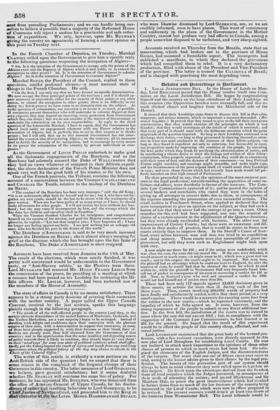In the French Chamber of Deputies, on Tuesday, Marshal CLAUSEL
called upon the Government to give him a specific reply to the following questions respecting the occupation of Algiers- .", 1st, Is it the intention of the Government to occupy only the points of the .African coast and the Regency of Algiers which it now holds, or to extend the 'occupation to other points? 2d, Is it the intention of Government to colonize Algiers ? 3d, Is it the intention of Government to evacuate Algiers?"
Marshal SOULT, the President of the Council, replied to these questions, amidst profound silence,--a most unusual state of things in the French Chamber. He said,
"On the first, I can only say that we have formed no specific determination.
now occupy the three principal points of the territory ; and if it should ap- pear necessary or convenient, either for the security of those points or any other Teason, to extend the occupation to other points, there is no difficulty in our doing so ; but at present we have come to no determination on the subject. As to the question of colonization, our intention is to favour it as much as possible. 3f companies present themselves who will undertake to colonize Algiers at their .own expense, they may depend on receiving every protection from Government -which they can desire ; but we do not consider it the interest of Government to undertake the colonization on its own responsibility. In reply to the third question of -the honourable Marshal, 1 have to repeat, that the Government has placed itself under no engagement whatever with any Power relative to the evacuation of Algiers, but is perfectly free to act in that respect as it thinks proper ; but I will add, that up to this moment Government has not enter- tained. the remotest idea ofevacuating Algiers ; on the contrary, all its measures tend to fortify the security of its occupation, and to encourage by every means in its power the colonization of the country by private individuals or coin- ponies."
As the Government of Louis PHILIP undertook to 'make good all the diplomatic engagements of the Bourbons, and as the Bourbons had solemnly assured the Duke of WELLINGTON that they bad no views whatever of conquest in their African expedi- tion, the above declaration of the French Prime Minister does not speak very well for the good faith of his master, or for his own.
One of the French journals, the Tribune, contains the following account of a conversation between the Viscount CH ATEAUBRI AND and CHARLES the Tenth, relative to the mishap of the Dutchess • BERRI.
"The conduct of the Dutchess has been very improper," said the old King; ""it is an unfortunate affair both for herself and for me; but I, who have not for- gotten my own youth, should be the last to be severe with the weaknesses of a poor woman. When one has been guilty of as many errors as I have, he should wake allowances for other people. I will not receive her here without her hus- band ; but she may come if accompanied by him, and the wrongs which she has done her children and ourselves shall be forgotten."
When the Viscount thanked Charles for his indulgence, and congratulated 'tiros& on the success of his mission, and paid his Majesty some courteous com- pliments, he replied—" Let not that surprise you ; I have forgotten all ; I have sio longer any feeling against anybody. I am now nothing but an unhappy old man, who has finished his part in the drama of this world."
The Dutchess D'ANGOULEME is said to be very much incensed against the Dutchess DE BERRI ; she is almost always weeping for grief at the disgrace which she has brought upon the fair fame of the Bourbons. The Duke DANGOULEME is more resi,gned.


















 Previous page
Previous page